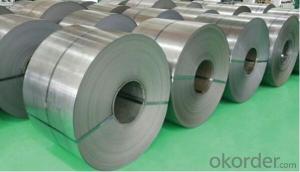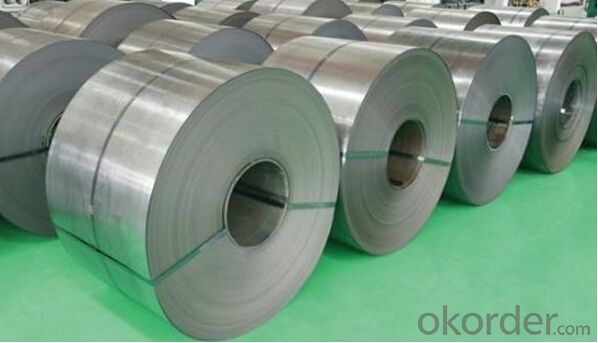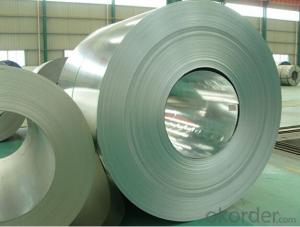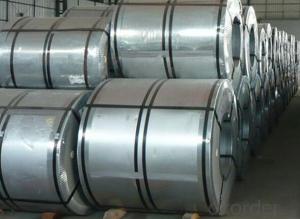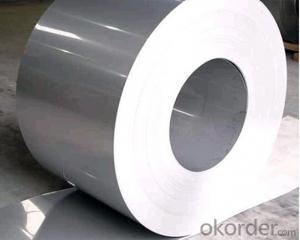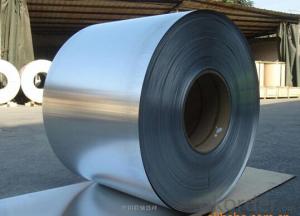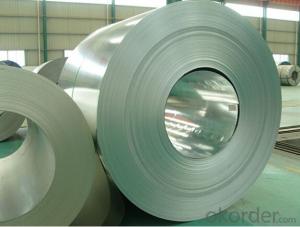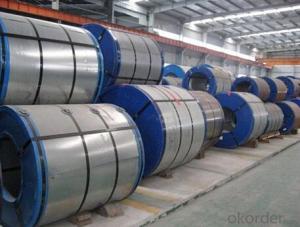Grade JIS G3141-SPCC-1B Galvanized Steel Coil
- Loading Port:
- Tianjin
- Payment Terms:
- TT OR LC
- Min Order Qty:
- 3 m.t.
- Supply Capability:
- 10000 m.t./month
OKorder Service Pledge
OKorder Financial Service
You Might Also Like
Specification
Grade JIS G3141-SPCC-1B Galvanized Steel Coil
Specification of Grade JIS G3141-SPCC-1B Galvanized Steel Coil
1. Galvanized Steel Coil
(1) Width: 600-1570mm
(2) Thickness: 0.13-5.0mm
(3) Grade: JIS G3302-SGCC-SGC570, SGCH (full hard-G550), SGHC-SGH540
EN10346-DX51D+Z, DX53D+Z, S250GD-S550GD
STM A653-CS-B, SS255-SS550
(4) Zinc Coating: Z40g/m2~Z500g/m2 (both side total coating thickness)
2. Galvalume Steel Coil
(1) Width: 600~1500mm
(2) Thickness: 0.15~2.30mm
(3) Grade: JIS G3321-SGLCC, SGLC400-570, (G550)
EN10346-DX51D+AZ, DX53D+AZ, S250-S550
ASTM A792M CS-B, SS255-SS550
(4) AZ Coating: AZ50~AZ185g/m2
3. Prepainted Galvanized Steel Coil (PPGI)
(1) Width: 600~1250mm
(2) Thickness: 0.19~1.50mm
(3) Grade: JIS G3312-CGCC, CGC340-570, (G550)
ASTM A755M CS-B, SS255-SS550
(4) Zinc Coating: Z40g/m2~Z500g/m2 (both side total coating thickness)
4. Prepainted Galvanized Steel Coil (PPGL)
(1) Width: 600~1250mm
(2) Thickness: 0.20~1.50mm
(3) Grade: JIS G3322-CGLCC, CGLC340-570, (G550)
ASTM A755M CS-B, SS255-SS550
(4) AZ Coating: AZ50~AZ185g/m2 (both side total coating thickness)
5. Cold Rolled Steel Coil (Soft) (for further information, pls click the product name)
(1) Width: 600~1570mm
(2) Thickness: 0.13~2.50mm
(3) Grade: JIS G3141-SPCC-SD, SPCD-SD, SPEC-SD
JIS G3135-SPFC 340/390/440
EN10130-DC01, DC03, DC04
SAE1006, SAE1008
ASTM A424-TypeⅡ
6. Cold Rolled Steel Coil (Full Hard) (for further information, pls click the product name)
(1) Width: 600~1570mm
(2) Thickness: 0.13~2.50mm
(3) Grade: JIS G3141-SPCC-1B, SPCC-1D
7. Hot Rolled Steel Coil
(1) Width: 1000~1524mm
(2) Thickness: 1.20~16.5mm, other thickness can be negotiation
(3) Grade: JIS G3101-SS400, JIS G3132-SPHT1/2/3, ASTM A36, Q195, Q235 etc.
Company Introduction of the Grade JIS G3141-SPCC-1B Galvanized Steel Coil
CNBM International Corporation is the most import and export platform of CNBM group(China National Building Material Group Corporation) ,which is a state-owned enterprise, ranked in 270th of Fortune Global 500 in 2015.
With its advantages, CNBM International are mainly concentrate on Cement, Glass, Iron and Steel, Ceramics industries and devotes herself for supplying high quality series of refractories as well as technical consultancies and logistics solution.
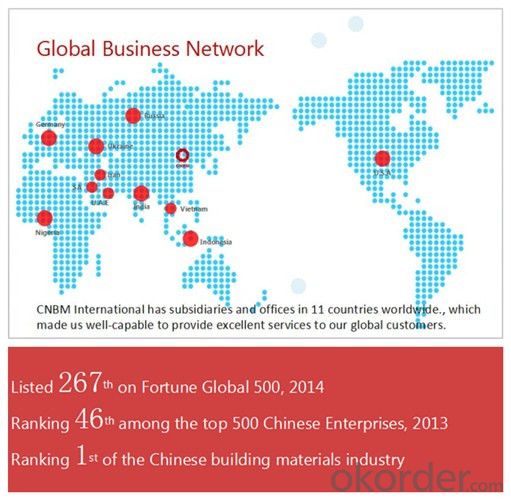
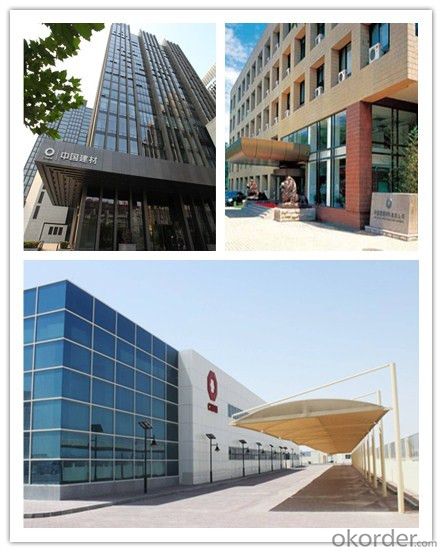
Packaging & Delivery of the Grade JIS G3141-SPCC-1B Galvanized Steel Coil
Packaging Detail | Sea worthy packing /as per customer's packing instruction |
Delivery Detail | 15 ~ 40 days after receiving the deposit |
Products Show:
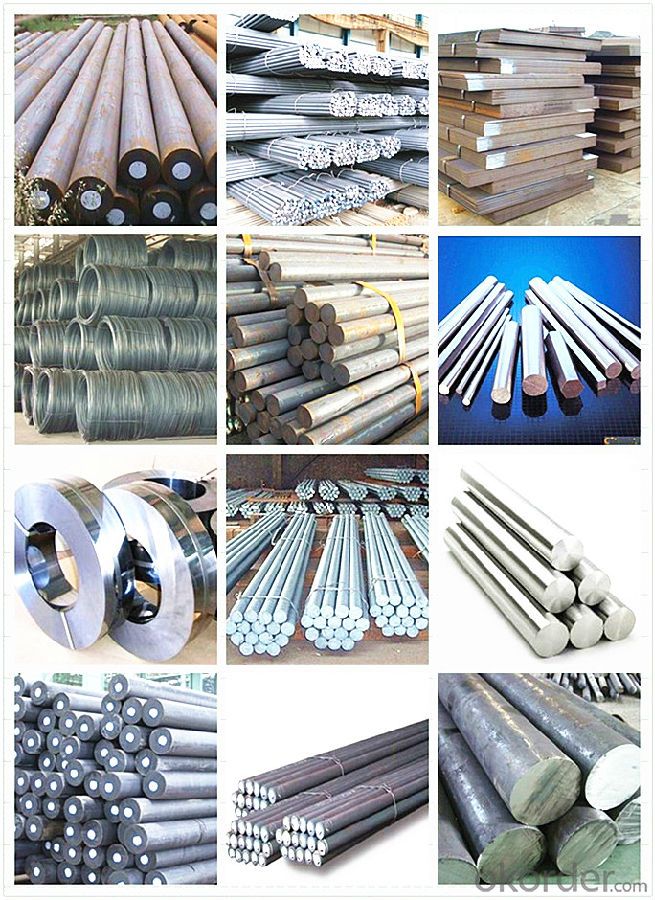
FAQ:
Are you a trading company or manufacturer? | Manufacturer |
What’s the MOQ? | 3 metric ton |
What’s your delivery time? | 15-35 days after downpayment received |
Do you Accept OEM service? | Yes |
what’s your delivery terms? | FOB/CFR/CIF |
What's the Payment Terms? | 30% as deposit,70% before shipment by T/T |
Western Union acceptable for small amount. | |
L/C acceptable for large amount. | |
Scrow ,Paybal,Alipay are also ok | |
Why choose us? | Chose happens because of quality, then price, We can give you both. Additionally, we can also offer professional products inquiry, products knowledge train (for agents), smooth goods delivery, excellent customer solution proposals. |
What's your available port of Shipment? | Main Port, China |
What’s your featured services? | Our service formula: good quality+ good price+ good service=customer's trust
|
Where are your Market? | Covering more than 160 countries in the world |
- Q: How is special steel used in the defense manufacturing process?
- Special steel is commonly used in the defense manufacturing process due to its exceptional strength, durability, and resistance to extreme conditions. It is utilized in the production of various defense equipment and components such as armored vehicles, submarines, aircraft carriers, and ballistic missiles. Special steel is crucial for enhancing the overall performance, reliability, and safety of these defense systems, making it an essential material in the defense manufacturing industry.
- Q: How is special steel used in the production of hydraulic components?
- Special steel is used in the production of hydraulic components due to its high strength, corrosion resistance, and ability to withstand extreme pressure and temperature conditions. It helps in manufacturing durable and reliable hydraulic parts such as cylinders, valves, fittings, and pistons, ensuring efficient functioning and long-lasting performance of hydraulic systems.
- Q: How does special steel perform in high-temperature environments?
- Special steel performs exceptionally well in high-temperature environments. It has a high melting point, excellent resistance to heat and thermal shock, and can retain its strength and hardness even at elevated temperatures. This makes it highly suitable for applications such as aerospace, power generation, and automotive industries, where materials are exposed to extreme heat and require exceptional performance and durability.
- Q: How is special steel produced?
- Special steel is typically produced through a combination of several processes, including melting, refining, casting, and heat treatment. It involves carefully selecting and blending various alloying elements to achieve desired chemical and mechanical properties. These elements are added to molten steel, which is then refined to remove impurities. The refined steel is then cast into various shapes and forms, such as bars, sheets, or tubes. Finally, the steel undergoes heat treatment processes like tempering or quenching to further enhance its strength and other properties.
- Q: What are the requirements for special steel used in automotive parts manufacturing?
- To ensure superior performance, safety, and durability of vehicles, specific and crucial requirements must be met for the special steel used in automotive parts manufacturing. Here, we outline some key requirements for this special steel: 1. The special steel used in automotive parts must possess high strength and hardness to withstand the extreme stresses and loads experienced by automotive components. This ensures that the parts can endure heavy usage, resist deformation, and avoid failure under demanding conditions. 2. In addition to strength and hardness, the special steel must also exhibit good ductility and toughness. Ductility allows for the formation and shaping of intricate automotive parts, while toughness ensures that the parts can absorb energy and resist fracture or cracking upon impact. 3. Automotive parts are constantly exposed to various environmental conditions, such as moisture, humidity, and road salts. Therefore, the special steel used in these parts must exhibit excellent corrosion resistance to prevent rust and deterioration, thereby increasing the longevity and reliability of the parts. 4. As automotive parts are often assembled through welding processes, it is essential for the special steel to have good weldability. This allows for efficient and secure joining of different components, ensuring structural integrity and minimizing the risk of weld defects. 5. The special steel used in automotive parts manufacturing should have sufficient heat resistance to withstand high temperatures generated during engine operation, friction, or other thermal processes. This ensures that the steel maintains its mechanical properties even under extreme heat conditions, preventing premature failure or deformation. 6. Automotive parts are subjected to repeated loading and unloading cycles, which can lead to fatigue failure if the steel does not have adequate fatigue strength. Therefore, the special steel should possess high fatigue strength to withstand cyclic loading and resist fatigue cracks, enhancing the durability and reliability of the parts. 7. Automotive parts need to maintain their shape and dimensions over time to ensure proper fit and functionality. Therefore, the special steel used in manufacturing should exhibit dimensional stability, minimizing any warping or distortion during heat treatment or operational conditions. 8. While meeting all these requirements, the special steel should also be cost-effective for automotive parts manufacturing. This means that the steel should be reasonably priced, readily available, and offer a good balance between cost and performance. Meeting these requirements is crucial for manufacturers to produce high-quality automotive parts that meet industry standards, perform optimally, and contribute to the overall safety and performance of vehicles.
- Q: How does special steel contribute to the food processing industry?
- Special steel contributes to the food processing industry by providing critical equipment and tools that ensure hygiene, efficiency, and safety in food production. It is used to manufacture high-quality blades, knives, and cutting tools that enable precise and clean cuts, reducing the risk of contamination. Additionally, special steel is utilized in the construction of food processing machinery and equipment, such as mixers, grinders, and conveyors, ensuring durability and resistance to corrosion. Its exceptional strength and heat resistance also make it suitable for applications like food storage and transportation, maintaining the integrity and quality of the products throughout the supply chain. Overall, special steel plays a crucial role in enhancing productivity, maintaining food safety standards, and improving the overall quality of food processing operations.
- Q: How does special steel perform in additive manufacturing applications?
- Special steel performs well in additive manufacturing applications due to its high strength, durability, and resistance to wear and corrosion. The unique properties of special steel, such as its ability to withstand high temperatures and extreme environments, make it an ideal material for 3D printing processes. Additionally, the flexibility and customization offered by additive manufacturing allows for the creation of complex geometries and intricate designs, further enhancing the performance of special steel in various applications.
- Q: How is free-cutting steel used in the manufacturing of screws and bolts?
- Free-cutting steel is used in the manufacturing of screws and bolts due to its exceptional machinability. It contains elements such as sulfur, phosphorus, lead, or selenium that act as lubricants during the cutting and machining process. These elements help to break the chips and reduce the friction between the metal and the cutting tool, resulting in improved efficiency and reduced tool wear. This type of steel enables faster production rates and higher precision in screw and bolt manufacturing.
- Q: What are the properties of special steel?
- Special steel has a high level of strength, durability, and resistance to corrosion. It also exhibits excellent heat resistance, hardness, and toughness, making it suitable for various applications in industries like aerospace, automotive, and construction. Additionally, special steel often possesses specific properties such as magnetic, electrical, or wear resistance, depending on its composition and treatment.
- Q: How does special steel perform under low temperatures?
- Special steel performs well under low temperatures due to its high ductility, toughness, and resistance to brittleness. It retains its strength and structural integrity, making it ideal for applications in extreme cold environments such as cryogenic storage, sub-zero manufacturing, and Arctic exploration.
Send your message to us
Grade JIS G3141-SPCC-1B Galvanized Steel Coil
- Loading Port:
- Tianjin
- Payment Terms:
- TT OR LC
- Min Order Qty:
- 3 m.t.
- Supply Capability:
- 10000 m.t./month
OKorder Service Pledge
OKorder Financial Service
Similar products
Hot products
Hot Searches
Related keywords
